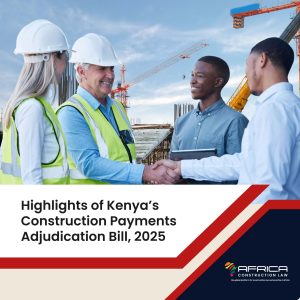Construction Adjudication in Kenya: A New Dawn?
by Ibrahim Godofa*[1] and Barkley Odhiambo**[2]
For many years, construction adjudication has not been comprehensively regulated in Kenya despite a clear need for the same amid a beehive of activity within the construction sector. Parties to construction disputes have had to rely on rules by professional bodies to settle construction disputes. There are no promises that these rules are either exhaustive or in line with international best practices. Over the last five years, the construction industry has been credited for being one of the main drivers of economic growth in Kenya. This trend is not expected to slow down anytime soon and investment in the sector is touted to increase in the coming years. One of the implications of this is that disputes will also inevitably grow in the sector. Quite simply, more activity in the sector would mean increased volume of potential disputes as well, as is the case in many other sectors.
The construction industry is a capital-intensive industry and there is a need to ensure that projects go on as smoothly as initially conceptualised. Part of the mechanisms to achieve this is the putting in place of sufficient and effective disputes avoidance, management, and settlement frameworks that are designed for and that respond to the needs of the industry. Construction adjudication is known to achieve just that. Construction adjudication has been designed as a dispute resolution mechanism before a 3rd party neutral adjudicator that is aimed at addressing contractual disputes e.g., cash-flow and disputed progress payments that would otherwise stall a construction project. Alleged breaches of contractual rights, claims for payment, and extension of time are some of the most common disputes which are submitted before this dispute resolution mechanism.
Although it is not well established in the Kenyan jurisdiction, construction adjudication has been effective in other jurisdictions. In the UK, the Housing Grants, Construction and Regeneration Act 1996 applies adjudication as an all-round dispute resolution mechanism in construction disputes. Adjudication is the compulsory form of ADR for all the contracts that are subject to the Act. The process is simple. An adjudicator is appointed, the dispute is referred to them within seven (7) days and the adjudicator has twenty-eight (28) days to reach a decision. The decision is to be acted upon immediately and the parties are jointly and severally liable for the fees incurred during the adjudication process. The 28 days turnaround time under the 1996 Act perfectly lives up to the mechanism’s reputation for quickly and efficiently addressing disputes that result in cash-flow problems in the construction sector. Ultimately, this plays an important role in preventing construction projects from stalling.
Construction adjudication can be both statutory e.g., under the 1996 Act above as well as contractual i.e., where parties insert a clause into their contract to submit disputes to adjudication. In the UK for example, contractual adjudication is used for disputes that are otherwise not subject to statutory adjudication i.e., not concerned with ‘construction operations.’ In the case of RWE Npower Plc v Alstom Power Ltd, where the subject matter was an engineering contract that was not entirely about “construction operations”, the parties to the contract nevertheless chose adjudication as their preferred mechanism for dispute resolution. The upshot of all these is that construction adjudication is and remains a go to dispute resolution mechanism for parties in the construction industry.
As earlier highlighted, unlike the UK, Kenya does not have a comprehensive framework that governs construction adjudication. This has not been for a lack of activity in the construction industry. To put this into perspective, the Joint Building and Construction Council’s (an organisation founded by The Architectural Association of Kenya (AAK) and the Kenya Association of Building and Civil Engineering Contractors (KABCEC) in 1980) 1999 ‘Green Book’, does not contain an adjudication clause despite being one of the most widely used construction contracts in the country. However, good news is on the horizon with the proposed amendment of the 1999 ‘Green Book’ to incorporate, among other things, an adjudication clause. To say that this recent development was overdue is an understatement. However, it is important to understand what the proposed amendments under the ‘Green Book’ mean for construction disputes in the country.
Adjudication is provided for under the proposed amendments as one of the mechanisms for settlement of disputes alongside other mechanisms such as arbitration and use of amicable settlement. Under the proposed amendments, a party to the dispute arising under the contract is entitled to refer the dispute to adjudication by one suitably-qualified adjudicator. The referring party is to issue a written dispute notice within seven (7) days to the other party. The referral notice of the dispute to adjudication is to be subsequently done within fourteen (14) days. The adjudication period, from the appointment of an adjudicator to the issuance of a reasoned decision, is set to take place within thirty (30) days with an option to extend by a further fifteen (15) days. Where there has been a failure to keep within the adjudication period, the proposed amendments contemplate the appointment of a different adjudicator to resolve the dispute within a similar adjudication period. An adjudicator is to be appointed by the parties within seven (7) days of receipt of the referral notice or where the parties fail to do this, within seven (7) days from the expiry of the referral notice period.
The proposed amendments also list several institutions that can act as appointing bodies on behalf of the parties. These include the Architectural Association of Kenya, the Chartered Institute of Arbitrators – Kenyan Branch, the Institute of Quantity Surveyors of Kenya, the Nairobi Centre for International Arbitration, the Institution of Engineers of Kenya, and the Institution of Construction Project Managers of Kenya. Sample adjudication rules to be used are set out in the proposed amendments with the provision that the latest version of the Chartered Institute of Arbitrators – Kenyan Branch Adjudication Rules can be used in the alternative, to the extent they are not inconsistent with the provisions of the ‘Green Book’. The adjudicator’s final decision is binding on the parties who are obliged to comply with it within thirty (30) days subject to any amicable settlement or an arbitral award. The proposed amendments exempt disputes relating to latent defects from reference to adjudication.
The proposed amendments to the ‘Green Book’ are a very welcome development in light of the role that construction adjudication can play in supporting the progress of projects in the construction industry. The famed ‘pay first, argue later’ approach has been a key part of workflow within the construction sector in many jurisdictions. It is time for the same to be realised in Kenya through incorporation of adjudication into a widely adopted contract. The proposed amendments have not yet been formally adopted and brought into place. However, the course taken through the draft amendments already makes for a good outlook. In light of the expected resultant growth and positive changes on the backdrop of these proposed amendments, it may well be the rise of a new dawn for construction adjudication and the construction industry in Kenya.
[1] Trainee Lawyer and a candidate for the Kenyan Bar. He is primarily interested in dispute resolution practice with a keen eye on domestic and international arbitration.
E-mail: ibrahimgodofa@gmail.com.
[2] Associate in the Dispute Resolution Practice at Bowmans (Coulson Harney LLP) in Nairobi, Kenya. He specializes in commercial litigation, employment & labour relation disputes with a particular interest in alternative dispute resolution mechanisms.
E-mail: barkleyodhiambo@gmail.com.


















